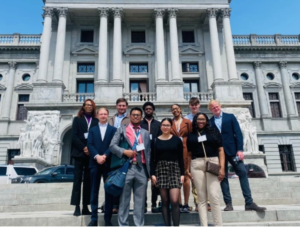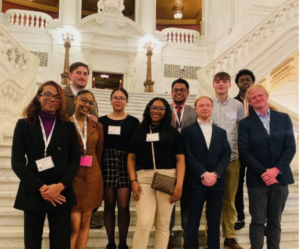Whether in a presidential cycle, such as in 2024, or any other year, knowledge of political science is an important area that individuals can derive a great benefit. An ever-evolving field, political science is relevant and current, providing a basis for how people interact with the world on a local, national, and international scale. By understanding the interworkings of politics, individuals are in a better position to make informed decisions on topics that impact their lives and the lives of others. Topics such as public policy, human rights, international relations, economic development, civic engagement, and more, are all at the heart of becoming a political scientist or embracing one of several other careers of which the study of political science will aptly prepare oneself.

All photos courtesy: Jeffrey Carroll
At Chestnut Hill College, no one understands this more than Jeffrey Carroll, Ph.D., associate professor of political science and chair of the Center for Data & Society. A trained political scientist with degrees from Boston College and Temple University, Carroll began teaching at Chestnut Hill College in 2015. In that time, Carroll has prioritized local politics and the role of students as “change agents” in their own communities.
“I’m thankful to be living and working in Philly politics and at Chestnut Hill because it’s part of the mission to work like just relationships,” says Carroll, who also runs the College’s BeatLab, a hip-hop centric music studio that fosters messages of social justice. “I am genuinely and sincerely grateful to being at the College and how this place supports its faculty and students. The spirit of who the Sisters of Saint Joseph are, and being in the community and living through it is not just lip service…The community is doing the hard work and the conversations around equity and inclusion are at the heart of how we engage with the community and our own colleagues every single say.”
Just as Carroll has felt supported, he has returned that tenfold and continues to empower students both in the classroom and outside of it, where he frequently leads students in real-world experiences within the political spectrum.
One such trip occurs annually as Carroll takes a group of students to Harrisburg for Student Aid Advocacy Day. This past spring, students were able to lobby the state legislature for greater student aid with the Association of Independent Colleges and Universities of Pennsylvania (AICUP). The AICUP is a statewide organization that serves the interests of independent, nonprofit higher education, like Chestnut Hill College, within the Commonwealth of Pennsylvania. During their trip, students shook hands with state representatives, and saw the floor of the state capital.
“It’s really cool to see students interact with people at the state legislature,” Carroll notes. “For some students it their first time meeting an elected official.
For Carroll, that experience and chance to network is paramount to why he continues to take students to this important day of policy advocacy. However, this is not the only extracurricular activity that Carroll, who also serves as the faculty advisor of the Students Political Science Association (SPSA) on campus, and vice president of the Pennsylvania Political Science Association (PPSA), has engaged students in. Under Carroll’s teaching, students have taken part in public policy dedates with other colleges, toured institutions such as Independence Hall and the Constitution Center in Philadelphia, promoted voter registration on campus and beyond, celebrated National Constitution Day, led campus-wide talks and public policy forums, and have ran several mock presidential elections. All to gain experience with the vast extents of political science within the walls of campus and the Greater Philadelphia region.

In March, Chestnut Hill College faculty including Jacki Reich, Ph.D., associate professor of political science and coordinator of the political science and international affairs majors, and adjunct professor, Matthew Schandler, Ph.D., along with a group of students, participated in the 84th Meeting and Conference of the PPSA, held at Shippensburg University. As program chair of the event, Carroll had the opportunity to invite several of his senior seminar students to present their research. “What they had to do in two months was a heavy lift and proud of them for going through all of the steps and taking feedback and integrating it into their final presentations,“ says Carroll about the benefit to the students’ of being able to present in front of colleagues from all over the state.
One student, John Munroe ’23, presented his senior seminar paper titled, “The Big Lie Worldwide: Election Denialism Beyond the United States” which focused on a comparative case study within the United States and Brazil. “I was taken back by how interesting and immersed it was at the seminar to be with similar and diverging interest in the political science field” says Munroe. Munroe used feedback from the conference to help drive his fine tuning of the final paper. which he presented on campus prior to graduating in May.
Munroe majored in political science but added an interdisciplinary legal studies minor, something he was able to do as a result of the College’s liberal arts curriculum. And it was that minor, Munroe says, that helped him get his career started as a legal assistant at a commercial litigation firm in Center City. “My resume stood out because I was a part of the Political Science Honor Society which my interviewer happened to be a part of and was framed on his office wall,” notes Munroe. “We were able to talk about our involvement and it made the interview process better.”
When reflecting on his experience at Chestnut Hill College, Monroe states, “I had a bit of culture shock coming from a large public school to a smaller liberal arts college, but it was a wonderful experience, and provided a well-rounded education in international and domestic politics. There’s such an investment in student needs and this school allows you to seamlessly find something that fits you.”
– Jaime Renman
